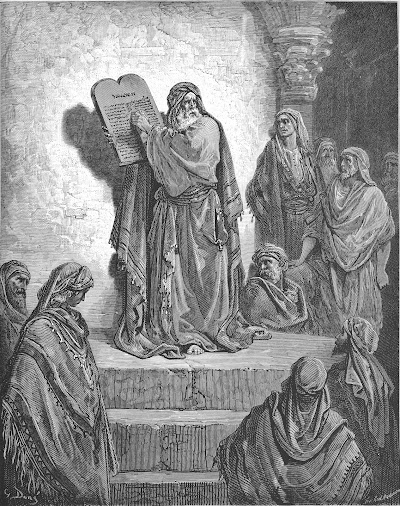“Today is holy to the LORD your God.
Do not be sad, and do not weep”–
for all the people were weeping as they heard the words of the law.
The walls of Jerusalem had been rebuilt and the exiles had returned. They themselves were the ones that gathered and asked to hear the book of the law of Moses read to them. Although Ezra read continuously from daybreak until midday it wasn't this that made the people said, for "all the people listened attentively to the book of the law." They were drinking it in, soaking in and absorbing it. Yet weep they did. In the book they heard wisdom that could have governed their lives and saved them from many lessons learned the hard way. They recognized all of the missed opportunities in their own lives that the wisdom of the law would have made available to them. They were beginning to lose themselves in the past, in regret, imagining what could have been.
He said further: “Go, eat rich foods and drink sweet drinks,
and allot portions to those who had nothing prepared;
for today is holy to our LORD.
The rebuilding of the wall of Jerusalem, the return of the exiles, the proclamation of the law, was meant to be a new beginning, not merely a reflection on all that had gone wrong in a misspent past. In order to break away from being consumed with regret and with guilt they had to be intentional. This new beginning could be a genuine time of joy and renewal. The returned people could learn how to live well in the sight of God. The walls of the city could be strengthened by the spiritual protection of God on those who kept his law. The emotions of the people drew them into the past in ways that were unhelpful. Their sadness had gone beyond mere conviction or contrition and was preventing them from receiving the word of God in the here and now, preventing them from being thankful for the good things he was doing in that moment for them.
Do not be saddened this day,
for rejoicing in the LORD must be your strength!
When sadness overwhelms us, when it is keeping us hostage to the past in ways that are unhelpful, rejoicing in the Lord can set us free. To us, in times of sadness, rejoicing seems to be too much of an irresponsible luxury. But it is genuine rejoicing in the Lord, more than newly built walls, that is meant to be our strength. Rejoicing is not merely escapism. It builds something practical, because everything that really lasts must be built, not merely in physical or societal structures, but in the foundations of our hearts.
The ordinances of the LORD that the people heard read to them were true, more precious than gold, and meant to give joy to the heart. Even so, the joy of the law pales in comparison to the joy that the message of the Kingdom is meant to impart.
Whatever town you enter and they welcome you,
eat what is set before you,
cure the sick in it and say to them,
‘The Kingdom of God is at hand for you.’
Jesus gave instructions to those who would spread his message that they not rely on themselves, but to go instead with a profound trust in God, and in the power of the Gospel message itself. They did not need their own money, or sack or sandals, and the message was too important to greet anyone along the way. Their treasure was the Gospel. Their bread was, first and foremost, the word of God. Their feet were shod with readiness to proclaim the good news.
The seventy-two were instructed that they were not to give in to discouragement when they encountered negative results or apparent failures. They too had to rely on rejoicing in the Lord and refuse to let the past cling to them or begin to define them.
Whatever town you enter and they do not receive you,
go out into the streets and say,
‘The dust of your town that clings to our feet,
even that we shake off against you.’
The Kingdom of God is at hand for us, and rejoicing can be our strength as well. But we too must be intentional. We must choose to celebrate those things which truly matter with rich feasts. Like Saint Jerome we can learn to treasure the Scriptures by which we come to have the saving knowledge of Christ. We too must shake off our past, and even the fact that we are not perfect yet, and refuse to let anything but the word of God define us. Our own human limitations can give way to the Gospel, which is a promise without limit, because what is promised is the gift of God's of divine life.
They are more precious than gold,
than a heap of purest gold;
Sweeter also than syrup
or honey from the comb.

No comments:
Post a Comment